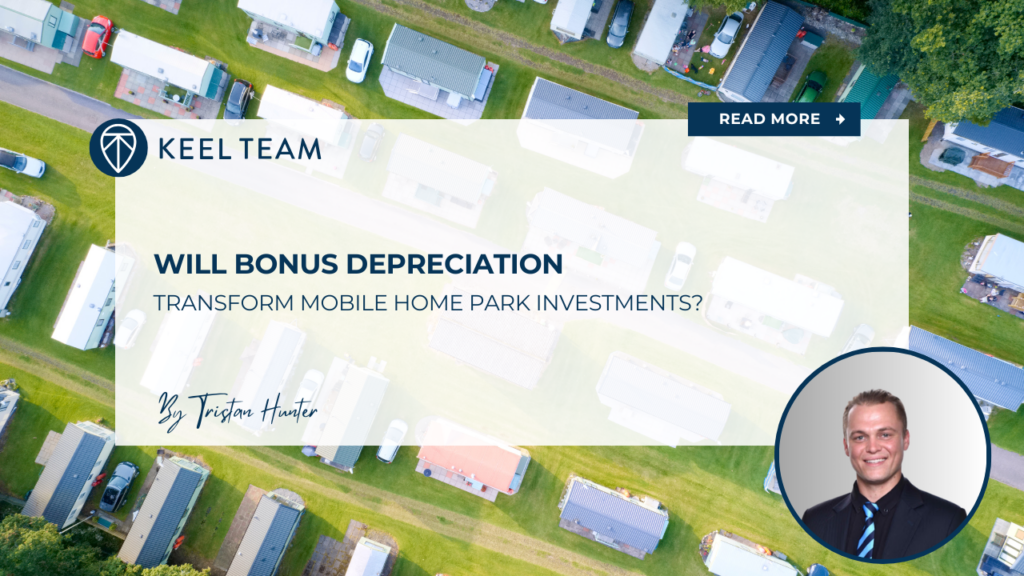100% Bonus Depreciation Tipped to Return for Mobile Home Park Investments in 2025!
-
 Tristan Hunter - Investor Relations
Tristan Hunter - Investor Relations

A recent announcement from Treasury Secretary Scott Bessent hints at the possible return of 100 percent bonus depreciation in a forthcoming tax bill. This development could create exciting opportunities for investors eyeing mobile home parks. House Republicans recently unveiled a sweeping tax and spending package that includes full bonus depreciation. If passed, this policy might make investing in mobile home parks more financially appealing by offering potential tax advantages.
Understanding Bonus Depreciation
Bonus depreciation generally allows businesses to deduct a substantial portion of an asset’s purchase price in the year of acquisition, rather than spreading the deduction over several years. With 100 percent bonus depreciation, investors may be able to deduct a significant amount from their taxable income in the first year of ownership. This immediate deduction contrasts with the standard depreciation schedule, which stretches deductions over decades.
The potential reinstatement of this tax benefit could be a game-changer for mobile home park investors. These properties often require significant upfront capital, and the ability to deduct depreciable mobile home park assets in the first year might boost cash flow, making investments more appealing.
Potential Benefits for Investors
If 100 percent bonus depreciation becomes law, investors in mobile home parks could see several advantages:
Reduced Tax Liability: Deducting depreciable mobile home park assets in the first year could reduce taxable income, potentially lowering tax liability and freeing capital for other investments
Improved Cash Flow: The immediate tax savings might give investors more liquidity to reinvest in property upgrades or additional acquisitions.
Faster Portfolio Growth: With enhanced cash flow, investors could expand their mobile home park portfolios more quickly, capitalizing on the growing demand for affordable housing.
Competitive Edge: Investors who act swiftly might secure prime properties before increased demand drives up prices.
Download our FREE eBook on the Top 20 things to know BEFORE investing in mobile home parks!
Legislative Journey and Policy Details
While the prospect of 100 percent bonus depreciation is exciting, the policy must navigate the legislative process. The proposed tax bill requires approval from both the House and Senate before reaching the president’s desk. Bessent expressed confidence in the policy’s inclusion, even suggesting it could apply retroactively to purchases made after January 20, 2025. Retroactive application might offer a windfall for investors who have already acquired mobile home parks this year, provided the properties meet eligibility criteria.
However, investors should remain cautious. Congressional negotiations can alter or delay the bill, and the final version might differ from the initial proposal. Staying informed and consulting tax professionals will be crucial for those hoping to leverage this potential tax break.
A Look Back: Bonus Depreciation in Context
The Tax Cuts and Jobs Act of 2017 introduced 100 percent bonus depreciation for qualified assets acquired after September 27, 2017, and before January 1, 2023. This policy spurred investment in capital-intensive industries, including real estate. However, the benefit began phasing out, dropping to 80 percent in 2023, with further reductions planned. The proposed tax bill aims to reverse this phase-out, restoring the full deduction rate.
For mobile home park investors, the historical impact of bonus depreciation offers a glimpse of its potential. The policy previously encouraged investment in real estate by improving cash flow and reducing tax burdens, and its return could reignite interest in mobile home parks as a stable, income-generating asset class.
Industry Support and Economic Impact
Organizations like the Manufactured Housing Institute (MHI) have long supported policies that incentivize investment in mobile home parks. According to the MHI, manufactured housing serves over 22 million Americans, providing affordable homes in a market where median home prices exceed $400,000. Bonus depreciation could spur expansions, creating construction jobs and improving infrastructure for residents
Bonus depreciation could amplify these economic contributions by encouraging investment in mobile home parks. Upgraded facilities, expanded trailer parks, and increased property acquisitions might create jobs and improve living conditions for residents, all while offering investors attractive returns.
Strategic Considerations for Investors
While the potential tax benefits are enticing, investors should approach mobile home park acquisitions with a clear strategy. Purchasing a mobile home park or joining a trailer park syndication should align with long-term financial goals. Experts advise against making decisions solely based on tax incentives, as market conditions, property quality, and operational challenges also play critical roles.
Timing is another factor. If bonus depreciation is reinstated, demand for mobile home parks could surge, potentially reducing available inventory and driving up prices. Investors who prepare now—by researching markets, building relationships with syndication groups, and consulting financial advisors—might position themselves to act quickly if the legislation passes.

Navigating the Opportunity
As the tax bill progresses through Congress, investors should stay proactive. Monitoring legislative updates and seeking guidance from tax and real estate professionals can help maximize the potential benefits of bonus depreciation. For those considering trailer park syndications, understanding the structure of these investments, where investors share risks and rewards, will be key to making informed decisions.
Financing also warrants attention. Whether purchasing a mobile home park outright or through a syndication, the method of financing (cash, loans, or partnerships) does not typically affect eligibility for bonus depreciation, as long as the property is used for business purposes. However, professional advice can ensure compliance with tax regulations and optimize financial outcomes.
FAQ: Bonus Depreciation and Mobile Home Parks
How does bonus depreciation apply to mobile home parks?
Mobile home parks used for business purposes, such as rental income generation, may be eligible for bonus depreciation. This allows investors to deduct a significant portion of the purchase price in the acquisition year.
What types of mobile home parks qualify?
Most mobile home parks, whether new or pre-owned, could qualify for bonus depreciation if they are primarily used for business purposes, such as leasing lots to residents.
How much business use is required?
To potentially qualify for bonus depreciation, a mobile home park may need to be used for business purposes at least 50 percent of the time. Personal or non-business use may not count toward this threshold.
Does financing impact eligibility?
The method of financing—whether through cash, loans, or syndications—typically does not affect eligibility for bonus depreciation, provided the mobile home park is used primarily for business purposes.
Looking Forward
The possible return of 100 percent bonus depreciation could mark a pivotal moment for mobile home park investors. By offering immediate tax relief and enhancing cash flow potential, this policy might unlock new opportunities in an asset class known for its stability and demand. As the legislative process unfolds, staying informed and prepared will be essential for investors eager to capitalize on this potential tax advantage. Whether you’re a seasoned investor or exploring the asset class for the first time, the coming months could bring exciting possibilities for growth in the mobile home park sector.
Are you looking for MORE information? Book a 1-on-1 consultation with Andrew Keel to discuss:
- A mobile home park deal review
- Due diligence questions
- How to raise capital from investors
- Mistakes to avoid, and more!
Disclaimer:
The information provided is for informational purposes only and is not investment advice or a guarantee of any kind. We do not guarantee profitability. Make investment decisions based on your research and consult registered financial and legal professionals. We are not registered financial or legal professionals and do not provide personalized investment recommendations.

Tristan Hunter - Investor Relations
View The Previous or Next Post
Subscribe Below 👇





